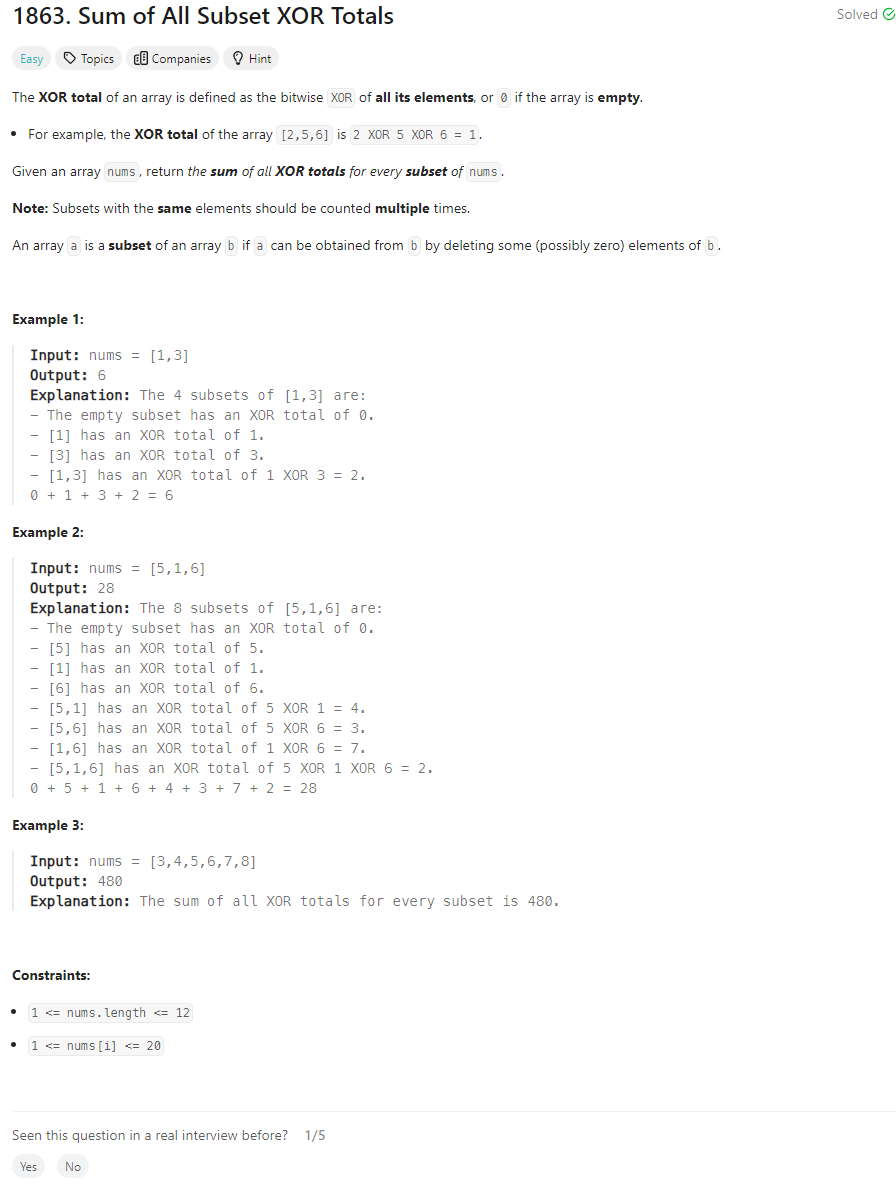Problem of The Day: Sum of All Subset XOR Totals
Problem Statement

Intuition
As I looked at the problem, I immediately thought of using a backtracking approach to generate all possible subsets of the given array. Then, I can calculate the XOR sum of each subset and sum them up to get the final result.
Approach
My approach involves defining a recursive function to generate all subsets using backtracking. Starting from an empty subset, I iterate through the array and at each step, I include the current element in the subset and recursively explore the remaining elements. After exploring all possibilities, I calculate the XOR sum of each subset and accumulate the results.
Complexity
- Time complexity: The time complexity of this approach is O(2^N * N), where N is the number of elements in the input array. This is because there are 2^N subsets to generate, and for each subset, we need to calculate the XOR sum which takes O(N) time.
- Space complexity: The space complexity is also O(2^N * N) because we need to store all generated subsets, each of which can have a maximum size of N.
Code
class Solution:
def subsetXORSum(self, nums: List[int]) -> int:
if not nums:
return 0
subsets = []
N = len(nums)
def backtrack(i, curr):
subsets.append(curr[:])
if i == N:
return
for j in range(i, N):
curr.append(nums[j])
backtrack(j + 1, curr)
curr.pop()
backtrack(0, [])
res = 0
for subset in subsets:
curr = 0
for num in subset:
curr ^= num
res += curr
return res
Editorial Solution
Approach 1: Generate All Subsets Using Backtracking
class Solution:
def subsetXORSum(self, nums):
def generate_subsets(nums, index, subset, subsets):
# Base case: index reached end of nums
# Add the current subset to subsets
if index == len(nums):
subsets.append(subset[:])
return
# Generate subsets with nums[i]
subset.append(nums[index])
generate_subsets(nums, index + 1, subset, subsets)
subset.pop()
# Generate subsets without nums[i]
generate_subsets(nums, index + 1, subset, subsets)
# Generate all of the subsets
subsets = []
generate_subsets(nums, 0, [], subsets)
# Compute the XOR total for each subset and add to the result
result = 0
for subset in subsets:
subset_XOR_total = 0
for num in subset:
subset_XOR_total ^= num
result += subset_XOR_total
return result
Approach 2: Optimized Backtracking
class Solution:
def subsetXORSum(self, nums: List[int]) -> int:
def generate_subsets( nums: List[int], index: int, current_XOR: int) -> int:
# Return current_XOR when all elements in nums are already considered
if index == len(nums): return current_XOR
# Calculate sum of subset xor with current element
with_element = generate_subsets(nums, index + 1, current_XOR ^ nums[index])
# Calculate sum of subset xor without current element
without_element = generate_subsets(nums, index + 1, current_XOR)
# Return sum of xor totals
return with_element + without_element
return generate_subsets(nums, 0, 0)